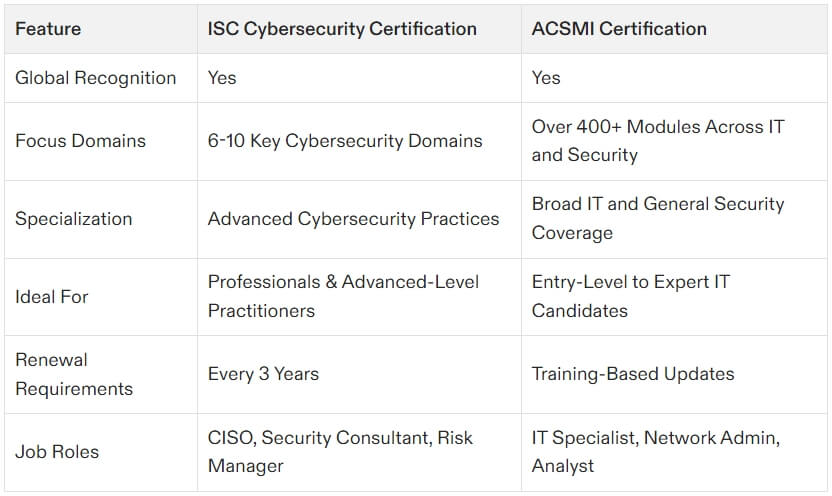Table of Contents
- What Is the ISC Cybersecurity Certification?
- Why Is ISC Cybersecurity Certification Essential?
- Key Domains Covered in ISC Certification
- Informative Table Comparing ISC Certification with ACSMI Certification
- How to Earn the ISC Certification
- Career Opportunities with the Certification
- FAQs About ISC Cybersecurity Certification
- Final Thoughts
The world of cybersecurity has never been more dynamic—or more critical. With millions of cyber-attacks emerging daily, skilled professionals are the first line of defense against digital threats. Whether you’re looking to advance in your current role or build a strong foundation in cybersecurity, the ISC Cybersecurity Certification is a credential that stands out.
This globally recognized certification proves your expertise and commitment to protecting sensitive digital environments. But why is it so valuable? What domains does it cover, and how does it compare with certifications like the ACSMI certification?
What Is the ISC Cybersecurity Certification?
The Certification, anchored by (ISC)², is one of the most trusted credentials in the field. This certification validates advanced cybersecurity skills across various domains, equipping professionals to mitigate risks, manage threats, and safeguard infrastructures.
Employers worldwide prioritize candidates holding ISC credentials, knowing they bring in-depth understanding and a disciplined approach to digital security management. With ISC Cybersecurity Certification on your resume, you’re set to stand apart in a competitive job market.
Why Is ISC Cybersecurity Certification Essential?
The Certification holds immense value for anyone aiming to thrive in cybersecurity. Here are some key benefits it provides:
- Global Prestige – Recognized in over 170 countries, this certification opens international doors for professionals.
- Career Elevation – Certified individuals often ascend into senior roles like Security Manager or Cybersecurity Analyst.
- Enhanced Knowledge – The rigorous learning and testing process ensures you’re well-versed in critical cybersecurity frameworks.
- Earning Potential – Professionals with ISC credentials often command higher salaries due to their specialized expertise.
Key Domains Covered in ISC Certification
This certification spans across a comprehensive array of cybersecurity topics, such as:
- Risk Assessment and Mitigation
- Secure Systems Architecture
- Incident Response and Recovery Strategies
- Cloud Security and Infrastructure
- Access Control Mechanisms
- Cryptography Principles
Professionals certified under ISC actively contribute to building secure systems and aligning these with evolving business and compliance needs.
Informative Table Comparing ISC Certification with ACSMI Certification
Key Features Comparison
While ISC Cybersecurity Certification emphasizes depth in cybersecurity, ACSMI offers a wider array of general IT-related topics. Both certifications can complement each other depending on your career goals.
To explore the ISC Cybersecurity Certification further, visit the certification platform.
How to Earn the ISC Certification
Earning your ISC Cybersecurity Certification involves these straightforward steps:
1. Check the Prerequisites
Confirm your eligibility. Most ISC certifications require professional experience ranging from 1 to 5 years in relevant cybersecurity fields.
2. Study Effectively
Prepare using official ISC training guides and online materials. Engage in practice exams to gauge your readiness.
3. Sign Up for the Exam
Locate an accredited ISC testing center or opt for their online proctored exam. Exam costs vary based on the certification type.
4. Stay Certified
ISC certifications must be renewed every three years. Maintain your credential by earning Continuing Professional Education (CPE) credits and paying a renewal fee.
Career Opportunities with the Certification
ISC Cybersecurity Certification unlocks prestigious roles in the cybersecurity domain, such as:
1. Security Consultant
A Security Consultant works closely with organizations to identify weaknesses in their cybersecurity frameworks. These professionals recommend solutions tailored to the specific needs of a company while ensuring compliance with industry regulations.
Key responsibilities include assessing risks, implementing firewalls, and designing robust security protocols. ISC Cybersecurity Certification equips consultants with advanced tools to perform vulnerability assessments and incident response frameworks efficiently.
Career Impact:
Many Security Consultants leverage ISC certification to gain credibility and secure prestigious contracts with enterprises or government agencies. Their expertise allows them to handle high-stakes environments, making them invaluable assets to any team.
2. Ethical Hacker
Certified ethical hackers, often known as penetration testers, simulate cyber-attacks to uncover potential vulnerabilities in an organization’s IT infrastructure. Their role is crucial in preempting breaches before malicious hackers exploit weaknesses.
ISC Cybersecurity Certification gives ethical hackers the knowledge needed to identify complex threats, use advanced hacking tools ethically, and protect proprietary information.
Career Impact:
Ethical hackers are highly sought-after, with salaries often ranging into six figures depending on location and expertise. The certification boosts their marketability by showcasing their competence in ethical systems auditing and attack prevention.
3. Cloud Security Specialist
With businesses adopting cloud technology rapidly, Cloud Security Specialists ensure these platforms are protected from data breaches and unauthorized access. They design secure cloud ecosystems, implement encryption protocols, and monitor cloud environments for unusual activity.
ISC Cybersecurity Certification provides in-depth skills for safeguarding cloud infrastructures, which align with best practices like zero-trust security models and advanced encryption.
Career Impact:
Cloud Security Specialists holding ISC credentials are primed for leadership roles in tech-first organizations. They often play crucial roles in guiding secure cloud migrations, earning high salaries and enjoying job stability in cloud-dependent sectors.
4. Risk Manager
Risk Managers are responsible for identifying, evaluating, and mitigating cyber risks that could impact an organization’s operations. They develop frameworks that minimize vulnerabilities and ensure compliance with data protection laws.
ISC Cybersecurity Certification focuses on topics like governance and risk management, enabling professionals to design robust policies and conduct risk assessments effectively.
Career Impact:
Risk Managers with ISC certifications are highly valued, especially in industries like finance, healthcare, and government services. They’re often rewarded with leadership opportunities due to their ability to balance security and operational needs strategically.
Additional Career Benefits
- Higher Salaries – ISC-certified professionals often earn 15-20% more than non-certified peers due to their proven expertise.
- Global Opportunities – With ISC certifications recognized in over 170 countries, professionals can pursue roles across a wide range of industries and regions.
- Professional Growth – The renewal process and ongoing requirement for CPE credits ensure that certified individuals stay ahead of the curve in their skills and knowledge.
FAQs About ISC Cybersecurity Certification
1. What is ISC Cybersecurity Certification?
It is a globally recognized credential validating skills in core areas like risk management, network security, and cryptography.
2. How difficult is the ISC exam?
It challenges even experienced professionals; hence, thorough preparation with ISC’s official materials is essential.
3. What sets ISC apart from ACSMI certification?
ISC focuses on advanced cybersecurity domains, while ACSMI offers over 400 topics, covering both IT fundamentals and specialized technologies.
4. What jobs can I get after earning ISC certification?
Roles like Security Analyst, Risk Manager, and Security Consultant are common for ISC-certified professionals.
5. How long does certification preparation take?
On average, preparation spans 3-6 months, depending on your familiarity with the exam topics.
Final Thoughts
Cybersecurity threats are evolving, and businesses need competent professionals to safeguard their digital environments. The Certification isn’t just a qualification—it’s a mark of excellence in cybersecurity. It validates your skills while opening new career opportunities and commanding trust from employers worldwide.
While ISC focuses on in-depth cybersecurity expertise, certifications like ACSMI can complement your knowledge if you’re looking to broaden your IT skill set.
Take the next step in your cybersecurity career. Achieve the ISC Cybersecurity Certification by starting your preparation today. Explore the opportunities waiting for you on the official platform.


Leave a Reply